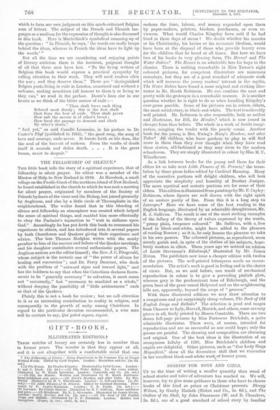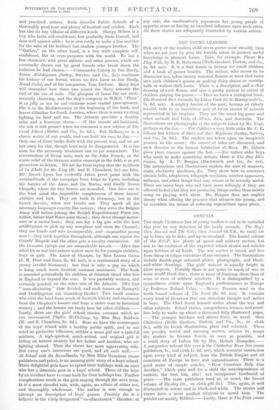STORIES FOR BOYS AND GIRLS.
Ur to the time of writing a smaller quantity than usual of school stories and tales of adventure has reached us. We will, however, try to give some guidance to those who have to choose books of this kind as prizes or Christmas presents. Sheepy Wilson, by Gunby Hadath (Nisbet and Co., 3s. ed.), and The Outlaw of the Shell, by John Finnemore (W. and R. Chambers; 3s. ed.), are of a. good standard of school story by familiar and practised writers. Both describe Public Schools of a thoroughly good tone and plenty of football and cricket. Each has also its boy villains of different kinds. Sheepy Wilson is a boy who lacks self-confidence, but gradually finds himself, and does well against odds ; he is also ready to make a fine sacrifice for the sake of his brilliant but.shallow younger brother. The " Outlaw," on the other hand, is a boy with complete self- confidence, but at cross-purposes with the world. He has a fine character, with great athletic and other powers, which are eventually drawn out by good friends who break down the isolation he had chosen.—Commander Currey in Ian Hardy, Senior Midshipman (Seeley, Service, and Co., os.), continues his history of our friend, whom we first knew as Ian Hardy, Naval Cadet, and of his companion, Tom Trefusis. Many boys will remember how those two joined the Navy towards the end of the era of sails. The glimpses of home life are senti- mentally charming, and the ship's company in H.M.S. ' Flora is as jolly as can be and contains some capital yam-spinners. She is in the Mediterranean at the beginning of the book, and leaves Gibraltar for South America, where there is some exciting fighting on land and sea. The Atlantic provides a deathly calm and a fearsome storm.—If this sounds old-fashioned, the risk is still greater when we commend a new edition of The Coral island (Nisbet anal Co., 3s. 6d.). But Ballantyne is a classic writer of our youth, and can hold his own to-day.- Only one of these books deals with the present war, and we are not sorry for this, though boys may be disappointed. It is too soon for the necessary treatment not to jar somewhere. The conversation of 'living men, such as Sir John French, or the comic relief of the German waiter conscript in the field, is as yet premature in fiction. We are far from saying that the incidents of In Khaki for the King (W. and R. Chambers, 5s.) are false. Mr. Escott Lynn has evidently taken great pains with the verisimilitude of the campaign from Liege to Ypres, including. the .battles of the Aisne and the Marne, and finally Neuvo Chapelle, where his two heroes are wounded. One does not in the least mind the :impossible completeness of these heroes' abilities and luck. They are both in Germany, one in the. Secret Service, when war breaks out. They speak all the necessary languages exactly like natives ; they serve the Belgian Army well before joining the, British Expeditionary Force (or, rather, before that Force joins them) ; they, rive strange motor- cars or a motor-boat ; they can lay a big gun . with the best artilleryman or pick up any aeroplane and cross the Channel ; they use hands and wits incomparably, and--impayables young men !—they stick together throughout, although one rejoins the Guards' Brigade and the other gets a cavalry commission. All the Germans except one are unspeakable rascals.—After this whirl let us sail into ealmer waters more fit for younger children, boys or girls. The Laird of Glentyre, by Miss Emma Green ('J. M. Dent and Sons, 3s. 6d. net), is a sentimental story of a young invalid Scotsman ; but that is only a peg on which is hung much more Scottish national sentiment. The book is intended particularly for children of Scottish blood who live in England or beyond the seas. It was probably written, and certainly printed, on the other side of the Atlantic. (We find " manufacturing " thus divided, and such names as Nasmyth and Duddiogston are stumbling-blocks.) Two small cousins who visit the laird learn much of Scottish history. and sentiment from the Chaplain's lessons and from a motor tour in historical scenery ; and the lessons are ready here for other children.— Lastly, there are the girls' school stories, amongst which we can recommend Phyllis MePhilemy, by Miss May Baldwin (We and R. Chambers, Ss. 6d.). Hero we have the counterpart of the boys' school with a healthy public spirit, and to our relief no particular villainess, neither a mean girl nor a spiteful, mistress. A high-spirited, quick-witted, and original girl is hiding an intense anxiety for her father and brother, 'who are fighting abroad. Thus she shows her most aggravating 'side.' But every one's intentions arc good, and all ends well. — ale School with the Roundheads, by Miss Elsie Oxenham (same publishers and price), is an amusing girls' story of a boys' school. Three delightful giris'have to spend their holidays with an aunt who has a domestic post M 'a boys' school. Three of the boys by an accident have to come back for their holidays too. Further complications result in the girls staying through the next term. It is a most cheerfultale, with,. again, no 'villain of either sex, and thoroughly wholesome. The author is wise enough to eatempt no description of boys' .games. Possibly she is a believer in vilely 'designated. " co-educationist" theories ; at any rate, she unobtrusively represents her young people of opposite sexes as having an excellent influence upon each other. All these stories are adequately illustrated by various artiste.





















































 Previous page
Previous page